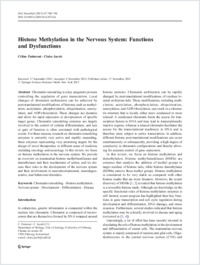Histone methylation in the nervous system : functions and dysfunctions
- Pattaroni, Céline Department of Biology, Unit of Zoology, University of Fribourg, Switzerland
- Jacob, Claire Department of Biology, Unit of Zoology, University of Fribourg, Switzerland
-
17.11.2012
Published in:
- Molecular Neurobiology. - 2013, vol. 47, no. 2, p. 740-756
English
Chromatin remodeling is a key epigenetic process controlling the regulation of gene transcription. Local changes of chromatin architecture can be achieved by post-translational modifications of histones such as methylation, acetylation, phosphorylation, ubiquitination, sumoylation, and ADP-ribosylation. These changes are dynamic and allow for rapid repression or de-repression of specific target genes. Chromatin remodeling enzymes are largely involved in the control of cellular differentiation, and loss or gain of function is often correlated with pathological events. For these reasons, research on chromatin remodeling enzymes is currently very active and rapidly expanding, these enzymes representing very promising targets for the design of novel therapeutics in different areas of medicine including oncology and neurology. In this review, we focus on histone methylation in the nervous system. We provide an overview on mammalian histone methyltransferases and demethylases and their mechanisms of action, and we discuss their roles in the development of the nervous system and their involvement in neurodevelopmental, neurodegenerative, and behavioral disorders
- Faculty
- Faculté des sciences et de médecine
- Department
- Département de Biologie
- Language
-
- English
- Classification
- Biological sciences
- License
-
License undefined
- Identifiers
-
- RERO DOC 30922
- DOI 10.1007/s12035-012-8376-4
- Persistent URL
- https://folia.unifr.ch/unifr/documents/302878
Statistics
Document views: 124
File downloads:
- Document: 251
